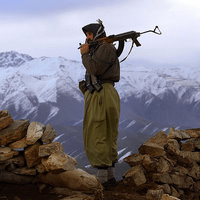By Francesco F. Milan | 11 Jul 2011
 Since the 1980s, the Kurdish separatist group Partiya Karkeren Kurdistan (PKK), labeled as a terrorist group by Turkey, the European Union and the United States, has been one of the main threats to Turkey’s domestic security. The PKK lost momentum after the group’s leader, Abdullah Ocalan, was captured in 1999. But since 2003, the turmoil resulting from military operations in Iraq has facilitated the creation of a new safe haven for PKK bases in the Qandil mountains in Iraqi Kurdistan. In the past few years, clashes between Turkish security forces and PKK militants have been interrupted only by sporadic and ineffective cease-fires, while the absence of credible political initiatives to address Turkey’s domestic Kurdish issue fuels frustration on both sides.
Since the 1980s, the Kurdish separatist group Partiya Karkeren Kurdistan (PKK), labeled as a terrorist group by Turkey, the European Union and the United States, has been one of the main threats to Turkey’s domestic security. The PKK lost momentum after the group’s leader, Abdullah Ocalan, was captured in 1999. But since 2003, the turmoil resulting from military operations in Iraq has facilitated the creation of a new safe haven for PKK bases in the Qandil mountains in Iraqi Kurdistan. In the past few years, clashes between Turkish security forces and PKK militants have been interrupted only by sporadic and ineffective cease-fires, while the absence of credible political initiatives to address Turkey’s domestic Kurdish issue fuels frustration on both sides.
Last year, nearly 100 Turkish soldiers and dozens of civilians were killed in PKK ambushes, carried out mainly in Turkey’s southeastern provinces. But attacks also hit major cities, especially Istanbul, and strategic infrastructure such as gas pipelines. Moreover, the PKK showed increased familiarity with the preparation and use of improvised explosive devices. More recently, in the run-up to June’s national elections, one policeman died when PKK militants attacked Prime Minister Recep Tayyip Erdogan’s campaign convoy, and in the past several weeks two policemen and four soldiers were killed in a number of different ambushes, while two more soldiers were kidnapped by the PKK just this weekend. A few weeks ago, Ocalan stated openly that the PKK will launch major attacks on Turkish soil should the government fail to commit to a genuine reform program on the Kurdish issue. …
via WPR Article | Turkey’s Kurdish Security Problems Require Political Solution.